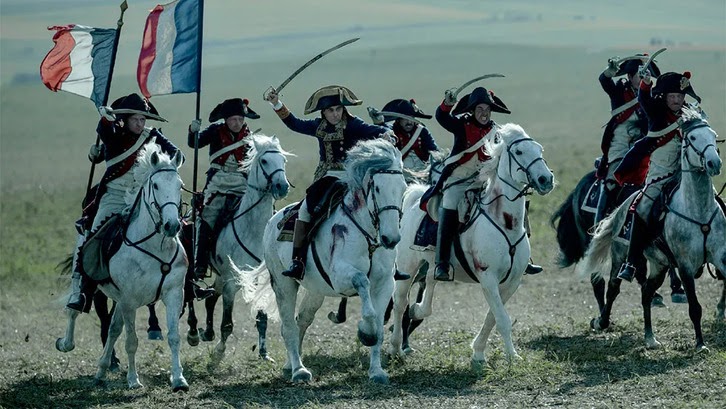
[ad_1]
He came from nothing. He conquered everything. Ridley Scott’s rags to riches tale of Napoleon; a general who conquered most of Europe – is anything but another Gladiator which many of you may have been expecting. Instead; it’s an inside look, thanks to the always brilliant multifaceted Joaquin Phoenix performance, of an addictive and volatile relationship with his wife, Josephine, who he marries but has to divorce after learning that she cannot bear a child. Now Emperor, the future of France is key – he must produce a heir. The film offers a blitz of all of the famous moments – the March on Russia, of course, the battle of Waterloo, his resignation and first exile, it’s all there – there’s so much to pack in a Napoleon film it’s no wonder that it’s 158 minutes yet Scott reportedly wants to make a four-hour version for AppleTV+, who are distributing this film. But then – a man who has lived and done so much; even Abel Gance couldn’t tell his story in 330 minutes back in 1927; devoting his epic to Napoleon’s early years.
Napoleon is focused on throwing these key scenes at you and skipping about in time like a brief Wikipedia summary of the man, the myth. There’s obviously a lot of playing with fact and history, Scott’s press tour, as ever, is the stuff of legends: his conquest of Egypt is best summarised by Napoleon blowing up the Pyramids forcing the Egyptians to surrender, and there’s multiple historical inaccuracies. But the movies are allowed not to follow history by 100% – they’re not documentaries after all, but historical fiction; and Scott uses this to tell a big, bold sweeping epic of the kind of stuff he is known for – whilst making the character study of Napoleon famously weird and painting him as an out of touch, possessive loser who pines obsessively for his wife Josephine whilst she takes a lover while he is a way. It’s a brilliant performance by Vanessa Kirby that matches Phoenix’s obsession with a power of her own: the corny lines that both have to deliver “destiny brought me this lamb chop” – are sold with convincing knowingness that adds to the eccentricity of the character rather undermines it. That said – it goes a bit too far the other way and we never get to see Napoleon shine as a leader beyond the early scenes; and the great battle on the ice – so when he reunites with his fifth army for his return to the throne you’re not quite convinced why they sided with him again at all. But then that’s perhaps the film’s greatest achievement: it tears down the cult myth of Napoleon, who shares more in common with Phoenix’s Commodus from Gladiator than Maximus Meridius.
The battle sequences are where Scott shines; the early siege of Toulon and the commandeering of the cannons is fantastic; we see Napoleon stumbling through yet claiming credit for it afterwards. It all of course – climaxes in the titanic battle of Waterloo, there’s no Richard Sharpe there of course, but its scale is felt – you get a sense of despair for the French troops in Russia on their doomed hopeless march, as Scott creates battle sequences that rival Kingdom of Heaven and Gladiator at their peak. When in full swing, Napoleon is appropriately grand – ambitious if formulative – and safe but confident. It’s a touch more well executed than the cumbersome House of Gucci, and more watchable than the stale The Last Duel. The fact that we even got to see an imagined interview with Wellington on the HMS Bellerophon, with Wellington being a constant presence and thorn in Napoleon’s side in the third act, is a remarkable study of history; the film even aware of the myth surrounding Napoleon’s height – he was around 5”6 rather than the commonly associated propaganda painting him as 5”2.
I read Sharpe’s Assassin by Bernard Cornwell at the perfect time going into this film and have appropriately downloaded Total War: Napoleon. The French Revolution is probably my favourite era of history but what follows is just as interesting.
Source link





